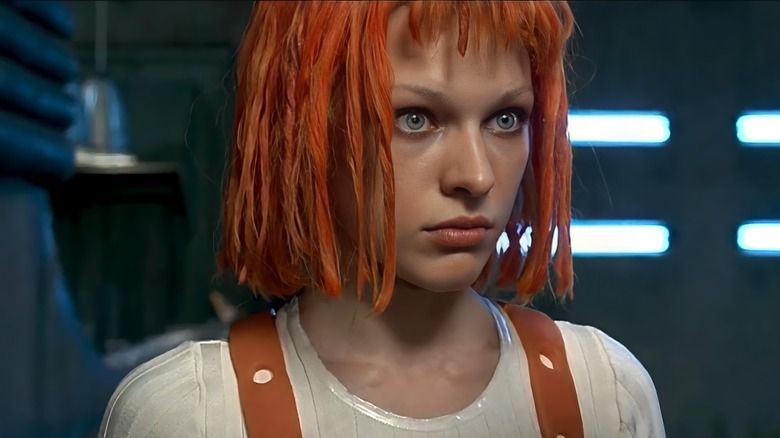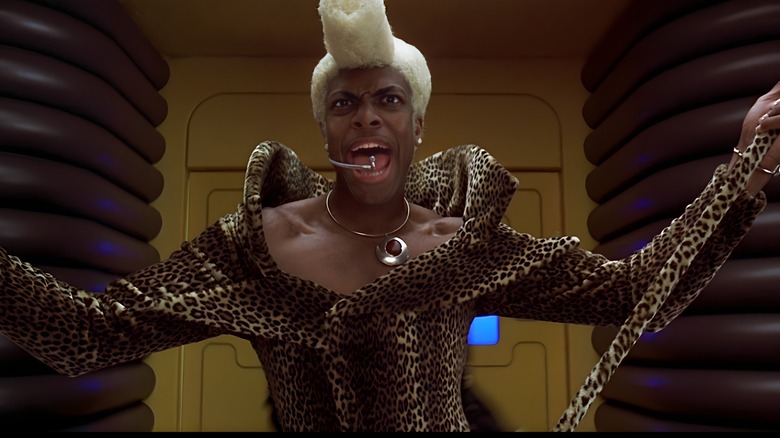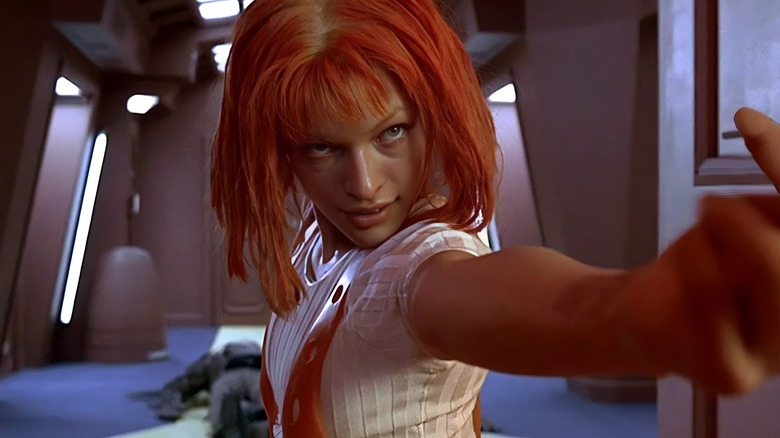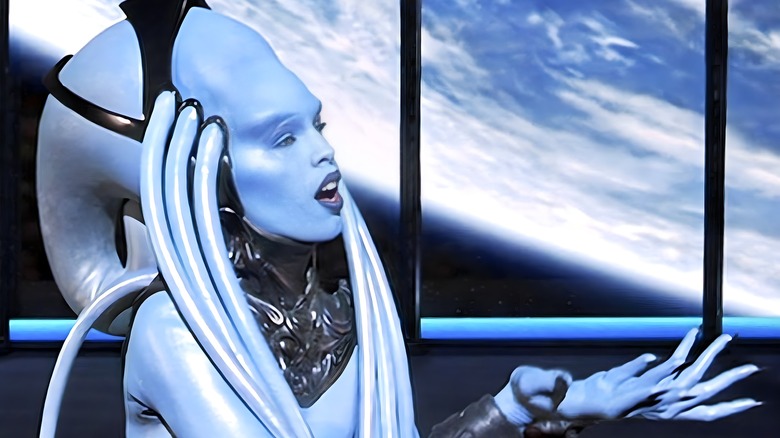Will We Ever See A Sequel To The Fifth Element?
It's hard to describe just how fresh and striking Luc Besson's sci-fi spectacular "The Fifth Element" felt in 1997. With a sci-fi decade that was dominated largely by formal, mannered "Star Trek" on TV, "The Fifth Element" was strange, colorful, and energetic. Its unusual future Earth was unique, and its cartoonish characters were funny and exciting. It was a broad and stylish adventure with the propulsion and tone of a slapstick farce. The film was very much like the expansive comic book "The Incal" by Alejandro Jodorowsky and artist Jean Giraud, aka Mœbius. Indeed, the similarities were so striking, the comic book distributor sued Besson for plagiarism. The case was dismissed, however, because Giraud was actually hired to work on the movie early in its production.
"The Fifth Element" was expensive, costing $90 million at the time, but was an enormous success, earning over $260 million worldwide. It became something of a minor sensation, and — as many Gen Xers can attest — college kids attended multiple times.
The story of "The Fifth Element" is the stuff of broad space operas. In 1914, a species of armored aliens hides a secret, special weapon in a cave on Earth. This is to prepare the planet for combat with an enormous ineffable force of evil that will next swing by Earth in 2263. Fast forward to the future, and a cab driver named Korben Dallas (Bruce Willis) will find himself in the company of a genetically "perfect" space alien name Leeloo (Milla Jovovich) whom he takes upon himself to protect. Leeloo is directly connected to the 1914 weapon and is determined to fight off the Ultimate Evil, which has appeared in the sky as, essentially, a living star.
Where to go from here?
2263 Earth is wild. Media personalities are bigger than ever, as seen in the figure of Ruby Rhod, played hilariously by Chris Tucker. There is also an evil Southern industrialist named Jean-Baptiste Emanuel Zorg (Gary Oldman) who aims to help the Ultimate Evil and controls a gang of scowling extraterrestrial warriors. Also, take note of the high-tech alien opera singer (played physically by Maïwenn Le Besco and voiced by Albanian soprano Inva Mula).
While on Earth, Leeloo finds that humanity may not deserve protection. She looks up the history of war and finds that humanity is responsible for myriad grievous atrocities. She falls into a deep sadness. While Korben hustles to find a quartet of magical stones (!), he finds himself falling in love with Leeloo. The stones represent the four elements of fire, water, earth, and air. When the Ultimate Evil lurks above, and everything is at its most desperate, Leeloo asks what Earth has that's worth saving. She and Korben find the one thing that's more powerful and enduring than war: love. Love, you see, is the fifth element. The Evil is blasted with powerful a beam of holy light emanating from Leeloo, and it dissipates into the cosmos.
Back in 2021, "The Fifth Element" co-screenwriter Robert Kamen hinted to Uproxx that a sequel might have always been in the works. Kamen explained that the original draft for the film was 180 pages, and he and Luc Besson eventually split off a lot of the excess material into fodder for a potential sequel. Whether or not that manifested as a second screenplay was unclear and he doesn't seem to imply that anything was in production or even pre-production.
Something original
A decade prior, in 2011, Luc Besson told Moviefone that a sequel was not happening as he wanted to make other original sci-fi movies instead. Since that interview, Besson has made "Lucy" and "Valerian and the City of a Thousand Planets," both exciting in their own ways. Besson's last movie, "Anna," came in 2019, although he has since been ousted over his history of inappropriate sexual behavior. It's unlikely he will work again.
Should there be a sequel to "The Fifth Element," then, it would have to happen without Luc Besson's input.
Given the cyclical nature of the film's premise, however — the ancient evil returns to Earth every 500 years — then an ambitious sequel could still be made. While Earth in 2263 was overcrowded, towering, and noisy, would it look the same ... in 2763? Korben, a human, would have passed away, although Leeloo, as far as we know, could still be alive; the longevity of her species is never discussed outright, so she could conceivably only look a little bit older — maybe in her late 40s? — in another half-millennium. And what does Leeloo think of Earth, now that she's watched multiple generations die out? Is the Earth now peaceful, or was it wracked by war?
If Leeloo saw the horrors of war firsthand, it might seem that love with a human — a fleeting experience at best — might not be enough to counteract the dour power of inevitable human violence. Leeloo, destitute and cynical, would have to find the motivation to fight off a returning Ultimate Evil once again, but might not be able to.
Earth in 2763
Milla Jovovich once said that she'd be happy to play Leeloo again in an interview with Collider, so a sequel could enjoy having at least one lead actor back. On Earth in 2763, the world will have to have changed dramatically. Perhaps Earth fell to a fascist leader — a descendent of Zorg, perhaps — and now lives in impoverished misery. Cities are larger than ever, but military service is compulsory. There are weapons everywhere and few places to take comfort. Think of Detroit as it was depicted in "RoboCop." The arts and sports and pop media that once colored the world are now little more than energetic, extra-slick propaganda.
If the fascist ruler can pretend they fought off the Ultimate Evil, they will cement their status as dictator for life. Perhaps the fascist has managed to emulate love in a lab and knows how to fight off the Evil, or something along those lines. It will be up to Leeloo, bitter and disillusioned, to use pure love to beat the fascist to the punch and expose them. Leeloo would no longer be the protected character, but the heroine. Jovovich has starred in enough action spectaculars in her career that she could certainly handle it.
Fast-forwarding 500 years is the logical narrative route to take, as it would serve as both a sequel and a reboot. Transforming Earth into a ruined fascist state would highlight the original film's themes of love vs. war. And, of course, there would need to be a lot of strange, colorful supporting characters and action sequences to keep audiences riveted.
So while there isn't a planned sequel to "The Fifth Element" currently in place, there's definitely room for a return.



